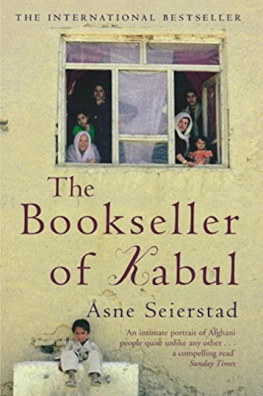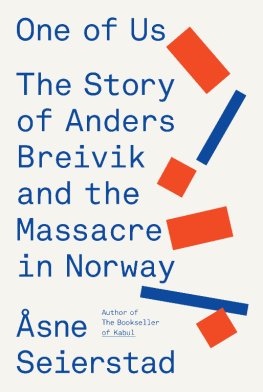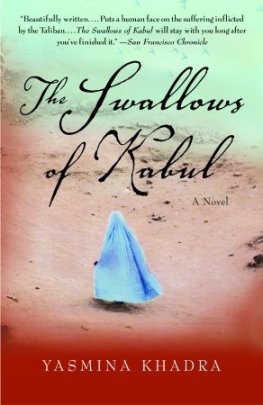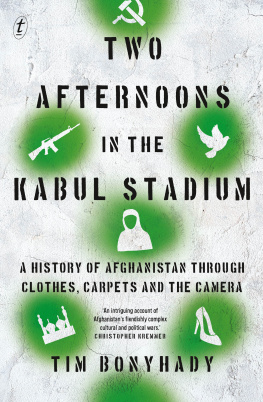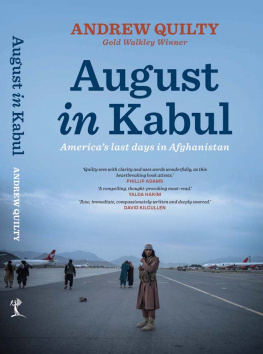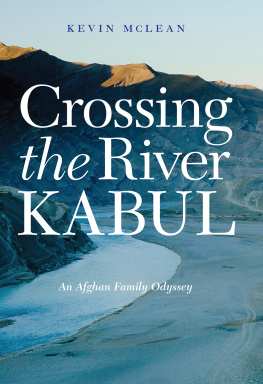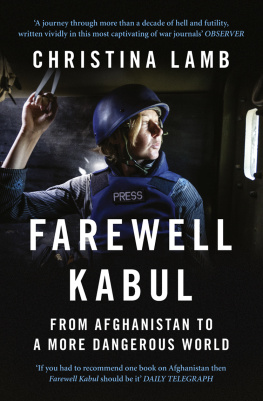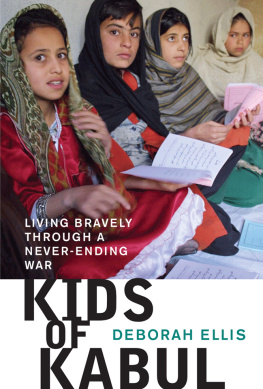The Bookseller of Kabul
ASNE SEIERSTAD
Hachette Digital
www.littlebrown.co.uk
Table of Contents
sne Seierstad was born in 1970 and studied Russian, Spanish and the History of Philosophy at Oslo University. She worked as a correspondent in Russia between 1993 and 1996, and in China in 1997. Between 1998 and 2000 she reported on the war in Kosovo for Norwegian television, and in 2000 she published With Their Backs to the Wall: Portraits from Serbia. In autumn 2001 she spent three months in Afghanistan, reporting for a number of major Scandinavian newspapers. In spring 2003 she reported on the war in Iraq from Baghdad.
sne Seierstad has received numerous awards for her journalism. The Bookseller of Kabul is one of the bestselling Norwegian books of all time, and has been translated into many languages.
Honestly and intelligently written... offers lessons to those who choose to heed it on the folly of trying to make simple diagnoses or to apply simple remedies in Afghanistan Isabel Hilton, Daily Telegraph
A colourful portrait of people struggling to survive in the most brutal circumstances... bears witness to the power of literature to withstand even the most repressive regime Michael Arditti, Daily Mail
A compelling picture of a country which tragically continues to tear itself apart Sunday Telegraph
A triumph. From the terrors and complexities of courtship through the perilous cross-country pilgrimage by a guilt-addled son to the agonising fate of a thieving carpenter, these are compelling little dramas, mined from the resource of every day life... and peopled by characters who bristle with life and emotion and individuality...while their stories delight with the freshness of something foreign, they are both universal and intimately personal... [the] works outward simplicity is matched by a subtle and complex understanding: the quality of truth Scotsman
Magnificent... Beautifully written, it dares to bestride incompatible worlds. It is the best outsider tale I have read from within the bounds of Islamic life since Sarah Hobsons Through Persia in Disguise, published twenty-nine years ago Scotland on Sunday
A unique insight into another world Daily Mirror
Moving and utterly gripping Big Issue in the North
A closely observed, affecting account... an admirable, revealing portrait of daily life in a country that Washington claims to have liberated but does not begin to understand Washington Post
Astounding... an international bestseller, it will likely stand as one of the best books of reportage of Afghan life after the fall of the Taliban Publishers Weekly
The Bookseller of Kabul
ASNE SEIERSTAD
Hachette Digital
www.littlebrown.co.uk
Published by Hachette Digital 2008
Copyright sne Seierstad, 2002
Translation Ingrid Christophersen, 2003
The moral right of the author has been asserted.
All rights reserved. No part of this publication may be reproduced, stored
in a retrieval system, or transmitted, in any form or by any means, without
the prior permission in writing of the publisher, nor be otherwise
circulated in any form of binding or cover other than that in which it is
published and without a similar condition including this condition being
imposed on the subsequent purchaser.
A CIP catalogue record for this book is available from the British Library.
ISBN 978 0 7481 0852 7
This ebook produced by JOUVE, FRANCE
Hachette Digital
An imprint of
Little, Brown Book Group
100 Victoria Embankment
London EC4Y 0DY
An Hachette Livre UK Company
For my parents
Foreword
One of the first people I met when I arrived in Kabul in November 2001 was Sultan Khan. I had spent six weeks with the commandos of the Northern Alliance - in the desert by the Tajikistani border, in the mountains of the Hindu Kush, in the Panshir Valley, and on the steppes north of Kabul. I had followed their offensive against the Taliban, I had slept on stone floors, in mud huts, and at the front, travelled on the back of lorries, in military vehicles, on horseback and on foot.
When the Taliban fell, I made for Kabul with the Northern Alliance. In a bookshop I happened upon an elegant, grey-haired man. Having spent weeks amongst gunpowder and rubble, where conversations centred on the tactics of war and military advance, it was refreshing to leaf through books and talk about literature and history. Sultan Khans shelves were weighed down by books in many languages; collections of poems, Afghan legends, history books, novels. He was a good salesman; when I left the shop after my first visit I was carrying seven books. I would often pop in when I had some spare time, to look at books and talk to the interesting bookseller, an Afghan patriot who felt let down by his country time and again.
First the Communists burnt my books, then the Mujahedeen looted and pillaged, finally the Taliban burnt them all over again, he told me.
I spent hours listening to the booksellers stories about his battles against the different regimes and their censors, how he launched his personal fight, hiding books from the police, lending them out to others - and finally going to prison for it. He was a man who had tried to save the art and literature of his country, while a string of dictators did their best to destroy them. I realized that he was himself a living piece of Afghan cultural history: a history book on two feet.
One day he invited me home for an evening meal. His family - one of his wives, his sons, sisters, brother, mother, a few cousins - was seated on the floor round a sumptuous feast.
Sultan recounted stories, the sons laughed and joked. The atmosphere was unrestrained, and a huge contrast to the simple meals with the commandos in the mountains. But I soon noticed that the women said little. Sultans beautiful teenage wife sat quietly by the door with the baby in her arms. His first wife was not present that evening. The other women answered questions put to them, accepted praise about the meal, but never initiated any conversation.
When I left I said to myself: This is Afghanistan. How interesting it would be to write a book about this family.
The next day I called on Sultan in his bookshop and told him my idea.
Thank you, was all he said.
But this means that I would have to come and live with you.
You are welcome.
I would have to go around with you, live the way you live. With you, your wives, sisters, sons.
You are welcome, he repeated.
On a foggy day in February I moved in with the family. My only possessions were my computer, some notebooks and pens, a mobile phone and what I was wearing. Everything else had disappeared en route, somewhere in Uzbekistan. I was welcomed with open arms, and gradually felt comfortable in the Afghan clothes I was lent.
I was given a mattress on the floor next to Leila, Sultans youngest sister, who had been assigned the task of looking after my well-being.
You are my little baby, the nineteen-year-old said the first evening. I will look after you, she assured me and jumped to her feet every time I got up.
Sultan had ordered the family to supply me with whatever I wanted. I was later told that whoever did not comply with this demand would be punished.
All day long I was served food and tea. Slowly I was introduced into family life. They told me things when they felt like it, not when I asked. They were not necessarily in the mood to talk when my notebook was at hand, but rather during a trip to the bazaar, on a bus, or late at night on the mattress. Most of the answers came about spontaneously, answers to questions I would not have had the imagination to ask.
Next page
